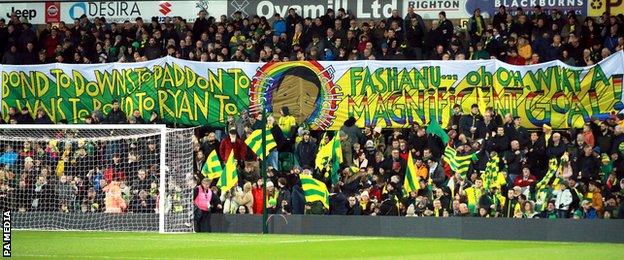Justin Fashanu: National Football Museum Hall of Fame induction 'deserved', says niece Amal
- Published
Justin Fashanu inducted into the National Football Museum's Hall of Fame
"I don't understand, even today, how Justin did it - he's one of the bravest men I've ever come across."
Amal Fashanu speaking about her uncle, Justin.
He was Britain's first £1m black footballer and won the BBC's Goal of the Season award for his memorable volley against Liverpool in February 1980.
He was also the first male English professional to come out as gay while still playing, back in 1990. He took his own life in 1998.
No top-level player has come out during their career since.
On Wednesday - what would have been Fashanu's 59th birthday - the former Norwich and Nottingham Forest striker was inducted into the National Football Museum's Hall of Fame.
Amal campaigns against discrimination in football and has spoken to the BBC's LGBT Sport Podcast about her uncle's legacy.
'He's been given the position he deserves'
The Justin Fashanu Foundation was co-founded by Amal, who produced the BBC Three documentary Britain's Gay Footballers in 2012.
She accepted the Hall of Fame award on his behalf at the National Football Museum in Manchester, which is timed to coincide with this year's LGBT History Month.
"He's here now [in the Hall of Fame], you guys have acknowledged him, we all respect him, he's been given the position he deserves, and for me, that's all I've ever wanted for Justin," she said.
"I always thought he was a brave man, doing this to respect who he was - but as time passes, I'm thinking 'wow'… we're still waiting for a current footballer to say 'this is who I am, and I'm going to follow in Justin's footsteps and I'm going to be real about my sexuality and who I am so I can live the best life I possibly can'.
"I don't understand, even today, how Justin did it - he's one of the bravest men I've ever come across. You've got a black man who is gay and religious, all in one, and you can add it all up and it just sounds like a recipe for disaster because it was a very different time,
"The fact that Justin just got up and said 'this is who I am, I'm going to respect myself and get others to respect me for who I am', that is one of the most impressive things. And for him, as my uncle, I couldn't think of anything more honourable and I look up to it every day."

A special commemorative banner depicted commentator Barry Davies' description of the pass sequence which ended with Fashanu's "magnificent goal" against Liverpool in 1980
On Saturday, a giant rainbow banner of Fashanu was unfurled by Norwich fans at Carrow Road to honour his goal of the season strike against Liverpool in February 1980, 40 years on.
Asked why there are no out gay male professional footballers, Amal says some people within the game feel it would "destroy the game, or make it less macho".
She added: "I guess that world doesn't want to accept a footballer being gay because of the image.
"I think as soon as one player comes out - and we support him the way we should support him - I think he'll be the one that people follow in the footsteps of.
"But I think until that moment it's going to be very difficult because obviously Justin did come out and took his own life, so a lot of people associate that and think right, if I come out, am I going to have all these kinds of pressures myself."
National Football Museum chief executive Tim Desmond said: "The National Football Museum Hall of Fame aims to recognise a wide diversity of individuals who have made an outstanding contribution to the game.
"Justin was a pioneer on many levels and with this award we acknowledge not only Justin's legacy but also the importance of the LGBT+ community within football."